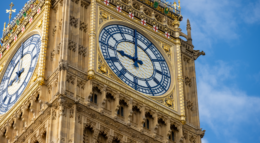
Leave sceptics wrong on tariffs
It is time for politicians and corporations to be realistic, accept Brexit is happening, and accept the UK is leaving the Single Market and the Customs Union, argues Matthew Ellery.
Having enjoyed a brief hiatus, the leave sceptics are back with vengeance. Project Fear is gone, replaced by Project Doubt. The optimism of Dyson, Boeing, Amazon and pro-Brexit companies is now being ignored in favour of the pessimism of the confectionery-maker, Mars Incorporated. They are spinning the truth, misrepresenting the situation, and projecting doom and gloom without apparent reference to reality.
Mars' President, Fiona Dawson, recently addressed the American Chamber of Commerce to the EU, delivering a Project Fear speech worthy of Nick Clegg. She claimed the price of chocolate would increase due to higher tariffs once the UK leaves the EU – resulting in tariffs of 30 per cent on confectionery, 20 per cent for animal products and over 15 per cent for cereals.
Significantly, however, the facts supporting this negative prediction are thread bear. A hard Brexit does not preclude the UK's ability to strike a trade deal with the EU; it simply means leaving the Single Market. These are two distinct concepts. The latter sees the restitution of the UK's sovereign powers, while remaining in the Single Market does not. Outside the EU and its Customs Union, the UK will be at liberty to sign free-trade deals across the globe – including with the EU.
The signing of a free-trade deal with the EU would include the elimination of tariffs. It doesn't require an increase in them, and therefore Ms Dawson's claims rely on a false premise. Neither the UK nor the EU wish to see this, as our economies are interdependent.
But, even if the UK doesn't sign a free-trade deal with the EU, Ms Dawson prediction is still unlikely to be realised. The tariffs which she quotes are not UK tariffs but, ironically, EU ones. She incorrectly assumes a UK outside the EU would continue with the EU's protectionist tariffs. But why would Britain wish to keep these? They inflate the cost of imports which is bad for the British consumer.
Theresa May frequently says she wants to see an outward-facing 'Global Britain'. We can therefore reasonably assume UK tariffs would fall post-Brexit, not remain the same, thereby undermining another pillar to Dawson's claims. We predict, with a reasonable degree of confidence, that the price of chocolate is not set to increase by 30 per cent as she predicts.
So, why is Mars making these claims? Cynics would argue it's down to Mars' considerable influence inside the European Union's machinery. They have long taken advantage of the EU's one-stop lobby shop; some estimates put Mars' annual EU lobbying budget at a formidable 400,000 Euros.
Some large companies have an inherent predisposition towards our continued membership of the EU. It affords corporate interests the ability to lobby legislators – who are relatively impervious to the fickle nature of public opinion – on a mass scale. Consequently, a sizeable body of legislation and complex rules have been made, which themselves help to restrict new competitors from gaining access to the market. As a result, only multinational companies with large compliance departments can have the resources to conform with all these rules. This destroys competition and damages consumer choice. This benefits large corporations, but not the public at large.
Twinned with Mars' pessimism are spurious comments from other about the Commonwealth. They argue the Commonwealth will lose out from Brexit. But this conclusion is slightly baffling, considering over 30 Commonwealth ministers came to London last week to discuss trade agreements. There is also a further Commonwealth summit due to be hosted in London next April.
Many Commonwealth countries, including Australia, South Africa, New Zealand, Canada, India, Kenya, Malaysia, Pakistan, Singapore and Sri Lanka, have already expressed their intentions to sign trade deals with the United Kingdom, contrary to pessimists' claims.
At Get Britain Out we're optimistic about the future. Project Fear was defeated repeatedly during the EU Referendum campaign. Its successor, Project Doubt, will be defeated too. Unsubstantiated claims about high tariffs after Brexit will be ignored. The laser-focussed obsession on the worst-case scenario will be scoffed at.
It is time for politicians and corporations to be realistic, accept Brexit is happening, and accept the UK is leaving the Single Market and the Customs Union. Focus ought to be paid to adapting in a global world, instead of the constrictions Britain endures within the EU. If companies adapt to Brexit Britain, they won't just survive, they'll thrive.












